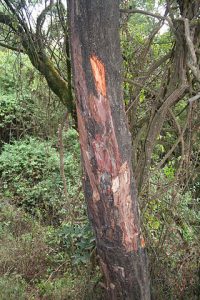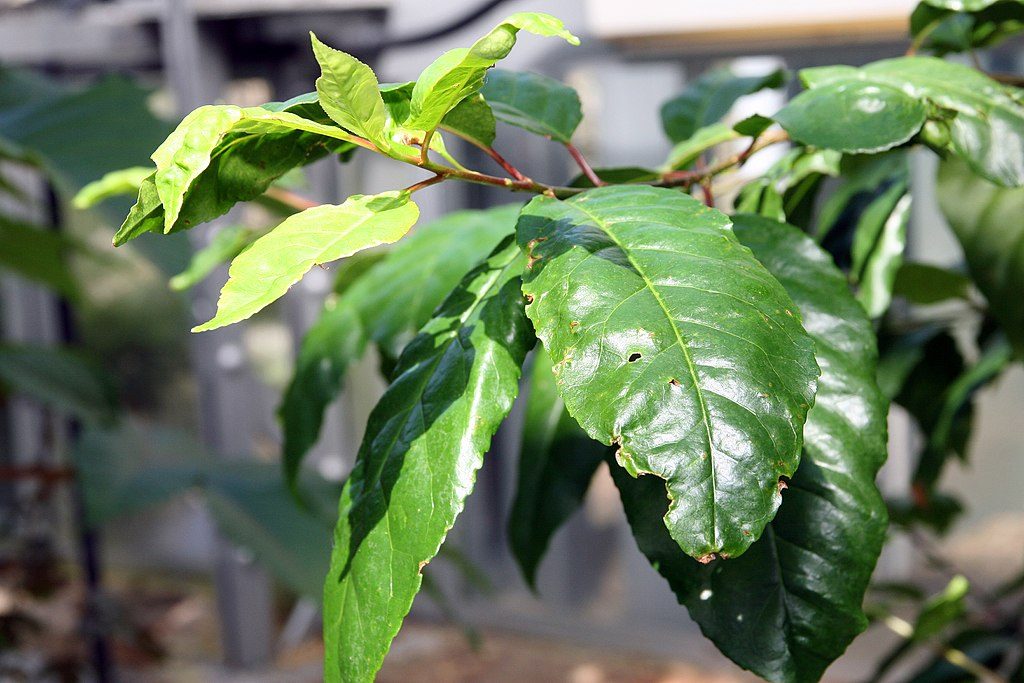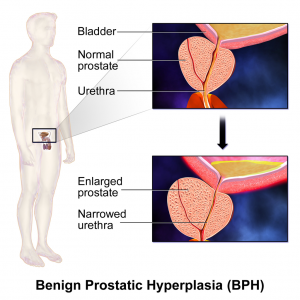Pygeum tree bark extract appears to alleviate BPH and prostatitis symptoms.

- Alleviating BPH. Pygeum may help improve the urinary symptoms of benign prostatic hyperplasia (BPH).
- Improving prostatitis. Early evidence suggests that pygeum reduces the inflammation involved in both BPH and prostatitis.
Overview
Pygeum (Pygeum africanum) is a tree native to central and southern Africa. Also known as the African cherry, African plum, and Prunus africana, pygeum’s bark has been employed in traditional medicine practices for thousands of years. According to local custom, the bark is ground and used to make a tea that relieves bladder and urination problems, as well as other common maladies such as fever.
Today, pygeum is widely used to make an extract for relieving benign prostatic hyperplasia (BPH) and prostatitis. In fact, the demand for pygeum is so high that the tree is considered threatened.
Clinical research conducted since the 1970s confirms that pygeum effectively relieves the urinary symptoms of BPH. Although it’s not yet clear exactly how pygeum aids prostate health, researchers believe that active compounds called phytosterols may be responsible.

How Pygeum Might Help With Prostate Health
The precise mechanisms through which pygeum supports prostate health are unknown. However, researchers have suggested several possibilities:
Reducing prostate cell growth

Other potential mechanisms include: 2
- anti-inflammatory activity that can help reduce the inflammation involved in BPH and prostatitis
- Changes in bladder contractility that can help improve urinary symptoms
- Inhibiting 5-alpha-reductase, an enzyme that converts testosterone to dihydrotestosterone (DHT), which has been implicated in BPH
Pygeum Uses & Benefits for Prostate Health
Pygeum is a popular herbal supplement for benign prostatic hyperplasia (BPH). In particular, it is used to relieve the urinary symptoms of BPH, such as:
- Frequent urination
- Difficulty starting or maintaining urination
- Excess urination at night (nocturia)
- Inability to complete empty the bladder
This popular use is supported by more than three decades of clinical research. The latest review of the highest-quality studies on using pygeum for alleviating BPH concluded that “A standardized preparation of Pygeum africanum may be a useful treatment option for men with lower urinary symptoms consistent with benign prostatic hyperplasia.” 3 In addition, pygeum is also used to relieve pain, inflammation, and sexual symptoms associated with prostatitis, although the research evidence for this use is not as strong.
Research
Human Research
Human studies of pygeum consistently report improvement of BPH symptoms. Although the quality of the published research is not as good as it could be due to a lack of high-quality placebo-controlled studies, systematic reviews of the available data support pygeum’s use for relieving urinary BPH symptoms. In addition, there is also some limited evidence that pygeum reduces prostatitis symptoms.
Pygeum extract Tadenan (100 mg) appears to improve symptoms of BPH
This randomized, double-blind study evaluated the efficacy of Tadenan (branded pygeum africanum extract) in the treatment of BPH. A total of 209 men were given either 50 mg pygeum extract twice daily, or one 100 mg dose, for a total of 2 months. Afterwards, 174 of the participants took 100 mg daily for another 10 months.
The study found that both dosing regimens similarly improved BPH symptoms (+38% vs +35%), quality of life scores (+28%), and urine flow after 2 months. Symptoms continued to improve after 12 total months of supplementation.
- The researchers concluded that “P. africanum extract at 50 mg twice daily and 100 mg once daily proved equally effective and safe at 2 months. Further improvements in efficacy with a satisfactory safety profile were documented after 12 months.” 4
This study looked at the benefits of Tadenan pygeum extract in people with BPH and chronic prostatitis. A total of 18 men were given Tadenan daily (200 mg) for 60 days. The supplementation improved urethral edema associated with prostatitis, and urinary and sexual health symptoms associated with both conditions.
- The researchers concluded that “Pygeum Africanum extract administration improved all the urinary parameters we investigated; prostatic echography revealed reduction of peri-urethral edema. Also an improvement of sexual behaviour has been obtained…” 5
Pygeum extract Tadenan (100 mg) may improve the urinary symptoms of BPH
This study evaluated the effects of pygeum africanum extract Tadenan in men with BPH. A total of 85 men were given the extract twice daily (100 mg total) for 2 months, with an additional month without supplementation to observe any persistent effects. After 2 months, Tadenan improved prostate symptom scores by an average of 40% and quality of life scores by 31%, with a particularly notable reduction in nighttime urination (32%). Measures of urinary flow also improved.
In addition, all improvements were maintained for the following month without treatment, suggesting that pygeum remains effective for some time even after supplementation is stopped.
- The researchers concluded that “…Pygeum africanum extract induces significant improvement in IPSS and uroflowmetry parameters.” 6
Pygeum extract (100 mg) appears to improve urinary symptoms of BPH
This placebo-controlled, double-blind study evaluated the use of pygeum extract for the urinary symptoms of BPH. A total of 263 men were given placebo or pygeum extract (50 mg) twice daily for 60 days. The treatment group experienced significant improvement, with 66% of the supplemented men showing reduction of urinary symptoms compared to only 31% for placebo.
- The researchers concluded that “Treatment with the Pygeum africanum extract led to a marked clinical improvement…” 7
This study compared the efficacy of Tadenan pygeum extract with Cernilton, a flower pollen extract. A total of 89 men with BPH were given one of the two extracts. Both groups experienced improvement of urinary BPH symptoms, although the number of people with significant improvement was higher for Cernilton (78% vs 55%).
- The researchers concluded that “This study shows that Cernilton is an effective therapy for patients with BPH.” 8
Dosage for Prostate Health
- Most research studies use 100 mg daily dosages
- Standalone pygeum supplements supply 100 mg bark extract dosages
- Multi-ingredient prostate supplements supply 50 mg bark extract dosages
Available Forms
- Pygeum bark. Powdered pygeum bark – the crudest form available.
- Pygeum bark extract. The form most commonly used in research studies that is typically standardized to a certain percentage of active phytosterols.
- Tadenan®. A branded pygeum extract that has been extensively studied and remains popular in Europe.
Supplements in Review Recommendation
- Pygeum bark extract, 100 mg daily for prostate health.
We recommend pygeum for supporting overall prostate health. Decades of research support pygeum’s effectiveness for alleviating the urinary symptoms of BPH, and there is also some evidence that it helps relieve prostatitis.
Most studies use 100 mg daily doses. Almost all successful human trials of pygeum used 100 mg extract doses, making it the most research-backed dose.
Leave a Reply